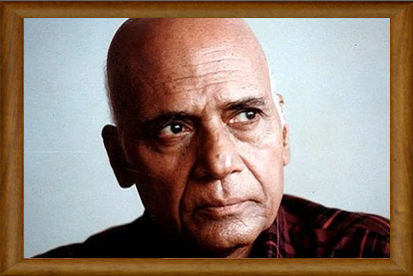Khayyam was born in a village Rahon in Jullundur, Panjab, in 1927. His real name was Mohammed Zahur but he got famous by the name of Khayyam in the film industry. He was never interested in his studies and was always fascinated by the music of Hindi cinema. He was inclined to the music when he was very young. He often escaped to the city for watching movies. Khayyam soon ran away to his uncle’s house in Delhi, in the hope of becoming an actor. Khayyam’s uncle enrolled him in a school. When he saw the boy’s passion for films, he allowed him to learn music, since in those days it was actually a step forward in realizing his ambition. He got his training in music under
Pandit Amar Nath. He also learned music under the famous music director duo
Husnlal-Bhagatram.
He went to Lahore looking for roles in films. But fate had something else in store for him. One day Khayyam had gone to meet G.A. Chisti one of the foremost music directors when young Khayyam who was listening to the composition by Chisti and sung to him its first part . Impressed Chisti gave him an offer of joining him as an assistant. Khayyam assited Chisti for six months and came to Ludiana in 1943. He was only 18 then. Later he moved to Bombay in 1946 with a wish to become an actor. He acted in S. D. Narang's Yeh Hai Zindagi (1947). But as he didn't got any more assignments he settled down as an assistant. He assisted many music directors like Aziz Khan,
Bulo C Rani, and
Husnlal-Bhagatram. He sang a duet with
Zohrabai in Romeo & Juliet (1947).
He got his first independent assignment as a music director in Zia Sarhadi's Foothpath in 1953. The songs of Footpath became very popular especially 'Shaam-e-Gham Ki Kasam..' sung by Talat Mehmood. In the mean time he used to compose numerous non-film songs with C. H. Atma, Mohd. Rafi etc. His songs reflected the traditional ghazal format. He did few more films after Footpath but none of them worked well for him. In 1958 he got Phir Subah Hogi. Its songs were written by Sahir Ludhianvi and they reflected Nehruite politics,e.g, 'Chin-o-Arab Hamaara..' and 'Woh Subah Kabhi To Aayegi..'. In 1961 he came out with Shola Aur Shabnam which was a hit and its songs gain enough popularity for Khayyam. He lost his freshness and was almost out of the scene till Kabhi Kabhi came out in 1975. It was a re-birth for him and he made a success full came back. Kabhi Kabhi placed him among the league of the top most music directors of that time. After the success of Kabhi Kabhi he got a series of films year by year. He came out with many hits like Shankar Hussain (1977), Trishool (1978), Noori (1979), Chambal Ki Kasam (1979), Thodi Si Bewafai (1980), Dard (1981) and Aahista Aahista (1981).
In 1981 he composed the songs of the classic Umraao Jaan. All the songs from Umraao Jaan became very popular and he got immense appreciation from all over the nation. He also got the prestigious
National Award for the music of the Umraao Jaan.
Beyond the film songs one can judge Khayyam's skill and sensibility in his non-film songs and ghazals. He worked with Begum Akhtar, Mukesh, Talat Mehmood, Meena Kumari etc. He won three Filmfare Awards: for Best Music in 1977 for Kabhi Kabhie and 1982 for Umrao Jaan, and a lifetime achievement award in 2010. He was awarded the 2007 Sangeet Natak Akademi Award in Creative Music, by the Sangeet Natak Akademi, India's National Academy of Music, Dance and Theatre. He was awarded the third-highest civilian honour, Padma Bhushan, by the Government of India for 2011. Khayyam married Jagjit Kaur in 1954 in one of the first inter-communal marriages in the Indian film industry. They had a son, Pradeep, who died of a heart attack in 2012. In his last days, Khayyam was suffering from various age related ailments. On 28 July 2019, Khayyam was admitted to Sujay Hospital in Juhu, Mumbai due to lung infection. He died on 19 August 2019 following a cardiac arrest at the age of 92.

